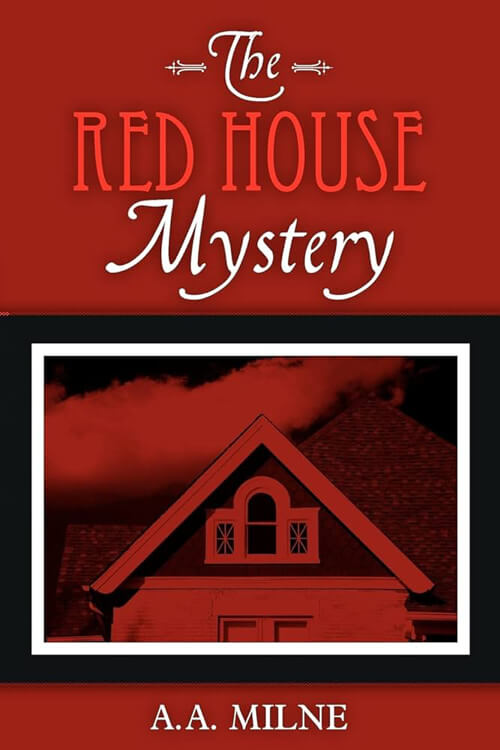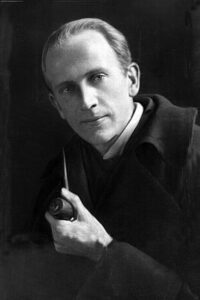
The Red House Mystery
In the drowsy heat of the summer afternoon, the Red House was taking its siesta. There was a lazy murmur of bees in the flower borders and a gentle cooing of pigeons in the tops of the elms. From distant lawns came the whir of a mowing machine, that most restful of all country sounds, making ease the sweeter in that it is taken while others are working.
It was the hour when even those whose business it is to attend to the wants of others had a moment or two for themselves. In the housekeeper’s room, Audrey Stevens, the pretty parlor maid, retrimmed her best hat and talked idly to her aunt, the cook-housekeeper of Mr. Mark Ablett’s bachelor home.
“For Joe?” said Mrs. Stevens placidly, her eye on the hat. Audrey nodded. She took a pin from her mouth, found a place in the hat, and said, “He likes a bit of pink.”
“I don’t say I mind a bit of pink myself,” said her aunt. “Joe Turner isn’t the only one.”
“It isn’t everybody’s color,” said Audrey, holding the hat out at arm’s length and regarding it thoughtfully. “Stylish, isn’t it?”
“Oh, it’ll suit you all right, and it would have suited me at your age. It’s a bit too dressy for me now, though I wear it better than others. I was never the one to pretend to be what I wasn’t. If I’m fifty-five, I’m fifty-five —that’s what I say.”
“Fifty-eight, isn’t it, Auntie?”
“I was just giving that as an example,” said Mrs. Stevens with great dignity.
Audrey threaded a needle, held her hand out, looked at her nails critically momentarily, and began sewing.
“Funny thing about Mr. Mark’s brother. I fancy not seeing your brother for fifteen years.” She laughed self-consciously and said, “Wonder what I should do if I didn’t see Joe for fifteen years.”
“As I told you all this morning,” said her aunt, “I’ve been here five years and never heard of a brother. I could say that before everybody if I were going to die tomorrow. There’s been no brother here while I’ve been here.”
“You could have knocked me down with a feather when he spoke about him at breakfast this morning. Naturally, I didn’t hear what had happened before, but they were all talking about the brother when I went in. Now, what was it I went in for? Was it hot milk or toast?—well, they were all talking, and Mr. Mark turns to me and says—you know his way—‘Stevens,’ he says, ‘my brother is coming to see me this afternoon; I’m expecting him about three,’ he says. ‘Show him into the office,’ he says, just like that. ‘Yes, sir,’ I say quite quietly, but I was never so surprised, not knowing he had a brother. ‘My brother from Australia,’ he says—I’d forgotten that there. From Australia.”
Read or download Book
A. A. Milne
Alan Alexander Milne (18 January 1882 – 31 January 1956) was an English writer best known for his books about the teddy bear Winnie-the-Pooh, as well as for children’s poetry. Milne was primarily a playwright before the massive success of Winnie-the-Pooh overshadowed all his previous work. Milne served in both world wars, as a lieutenant in the Royal Warwickshire Regiment in the First World War and as a captain in the Home Guard in the Second World War.
Milne was the father of bookseller Christopher Robin Milne, upon whom the character Christopher Robin is based. It was during a visit to London Zoo, where Christopher became enamored with the tame and amiable bear Winnipeg, that Milne was inspired to write the story of Winnie-the-Pooh for his son. Milne bequeathed the original manuscripts of the Winnie-the-Pooh stories to the Wren Library at Trinity College, Cambridge, his alma mater.
Early life
Alan Alexander Milne was born in Kilburn, London, to John Vine Milne, born in Jamaica, and Sarah Marie Milne (née Heginbotham) on 18 January 1882. He grew up at Henley House School, 6/7 Mortimer Road (now Crescent), Kilburn, a small independent school run by his father. One of his teachers was H. G. Wells, who taught there in 1889–90. Milne attended Westminster School and Trinity College, Cambridge, where he studied on a mathematics scholarship, graduating with a B.A. in Mathematics in 1903. He edited and wrote for Granta, a student magazine. He collaborated with his brother Kenneth, and their articles appeared over the initials AKM. Milne’s work came to the attention of the leading British humor magazine Punch, where Milne was to become a contributor and later an assistant editor. Considered a talented cricket fielder, Milne played for two amateur teams composed mainly of British writers: the Allahakbarries and the Authors XI. His teammates included fellow writers J. M. Barrie, Arthur Conan Doyle, and P. G. Wodehouse.
Milne joined the British Army during World War I and served as an officer in the Royal Warwickshire Regiment. He was commissioned into the 4th Battalion, Royal Warwickshire Regiment, on 1 February 1915 as a second lieutenant (on probation). His commission was confirmed on 20 December 1915. He served on the Somme as a signals officer from July to November 1916, but he caught trench fever and was invalided back to England. Having recuperated, he worked as a signals instructor before being recruited into military intelligence to write propaganda articles for MI7 (b) between 1917 and 1918. He was discharged on 14 February 1919 and settled in Mallord Street, Chelsea. He relinquished his commission on 19 February 1920, retaining the rank of lieutenant. In 1921, Milne bought the 18-inch Alpha Farnell teddy bear for his son (who would name it Edward, then Winnie) from Harrods department store in London.
After the war, he wrote a denunciation of war titled Peace with Honour (1934), which he retracted somewhat with 1940’s War with Honour. During World War II, Milne was one of the most prominent critics of fellow English writer (and Authors XI cricket teammate) P. G. Wodehouse, who was captured at his country home in France by the Nazis and imprisoned for a year. Wodehouse made radio broadcasts about his internment, which were broadcast from Berlin. Although the light-hearted broadcasts made fun of the Germans, Milne accused Wodehouse of committing an act of near treason by cooperating with his country’s enemy. Wodehouse got some revenge on his former friend (e.g. in The Mating Season) by creating fatuous parodies of the Christopher Robin poems in some of his later stories, and claiming that Milne “was probably jealous of all other writers…. But I loved his stuff.”
Milne married Dorothy “Daphne” de Sélincourt (1890–1971) in 1913, and their son Christopher Robin Milne was born in 1920. In 1925, Milne bought a country home, Cotchford Farm, in Hartfield, East Sussex.
During World War II, Milne was a captain in the British Home Guard in Hartfield & Forest Row, insisting on being plain “Mr. Milne” to the members of his platoon. He retired to the farm after a stroke and brain surgery in 1952 left him an invalid, and by August 1953, “he seemed very old and disenchanted.” Milne died in January 1956, aged 74.






